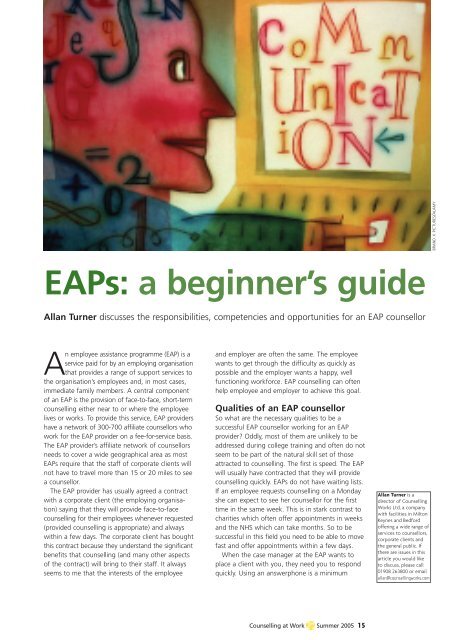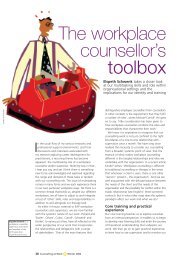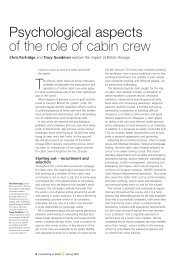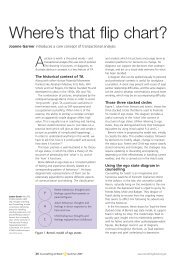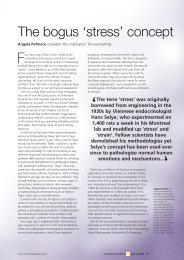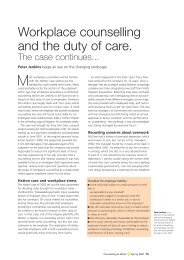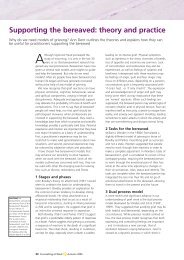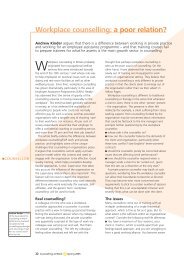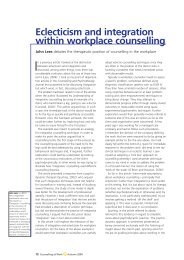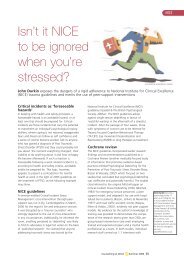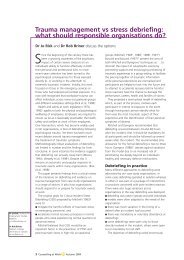EAPs: a beginner's guide - BACP Workplace
EAPs: a beginner's guide - BACP Workplace
EAPs: a beginner's guide - BACP Workplace
You also want an ePaper? Increase the reach of your titles
YUMPU automatically turns print PDFs into web optimized ePapers that Google loves.
BRAND X PICTURES/ALAMY<strong>EAPs</strong>: a beginner’s <strong>guide</strong>Allan Turner discusses the responsibilities, competencies and opportunities for an EAP counsellorAn employee assistance programme (EAP) is aservice paid for by an employing organisationthat provides a range of support services tothe organisation’s employees and, in most cases,immediate family members. A central componentof an EAP is the provision of face-to-face, short-termcounselling either near to or where the employeelives or works. To provide this service, EAP providershave a network of 300-700 affiliate counsellors whowork for the EAP provider on a fee-for-service basis.The EAP provider’s affiliate network of counsellorsneeds to cover a wide geographical area as most<strong>EAPs</strong> require that the staff of corporate clients willnot have to travel more than 15 or 20 miles to seea counsellor.The EAP provider has usually agreed a contractwith a corporate client (the employing organisation)saying that they will provide face-to-facecounselling for their employees whenever requested(provided counselling is appropriate) and alwayswithin a few days. The corporate client has boughtthis contract because they understand the significantbenefits that counselling (and many other aspectsof the contract) will bring to their staff. It alwaysseems to me that the interests of the employeeand employer are often the same. The employeewants to get through the difficulty as quickly aspossible and the employer wants a happy, wellfunctioning workforce. EAP counselling can oftenhelp employee and employer to achieve this goal.Qualities of an EAP counsellorSo what are the necessary qualities to be asuccessful EAP counsellor working for an EAPprovider? Oddly, most of them are unlikely to beaddressed during college training and often do notseem to be part of the natural skill set of thoseattracted to counselling. The first is speed. The EAPwill usually have contracted that they will providecounselling quickly. <strong>EAPs</strong> do not have waiting lists.If an employee requests counselling on a Mondayshe can expect to see her counsellor for the firsttime in the same week. This is in stark contrast tocharities which often offer appointments in weeksand the NHS which can take months. So to besuccessful in this field you need to be able to movefast and offer appointments within a few days.When the case manager at the EAP wants toplace a client with you, they need you to respondquickly. Using an answerphone is a minimumAllan Turner is adirector of CounsellingWorks Ltd, a companywith facilities in MiltonKeynes and Bedfordoffering a wide range ofservices to counsellors,corporate clients andthe general public. Ifthere are issues in thisarticle you would liketo discuss, please call01908 263800 or emailallan@counsellingworks.comCounselling at Work Summer 2005 15
<strong>EAPs</strong>: beginner’s <strong>guide</strong>‘EAP providers genuinely go to a lot of trouble toprotect the client’s confidentiality and do not feedback identifiable details to employers. They will onlyreport in general statistical terms saying how manyemployees have used the scheme, giving broadpresenting problems headings‘requirement and is probably not going to let youproduce a quick enough response. You need amobile that you carry with you and turn on. Mobilesare for <strong>EAPs</strong> to contact you quickly, they are notdevices only to be used if the car breaks down! Ihave noticed a recent questionable practice where<strong>EAPs</strong> leave a message with various counsellors andgive the work to the first one to return the call. Ihave called back a case manager, on a Sunday,within 20 minutes of a message being left for me,only to be told that I am too late! The potentialreferral has gone elsewhere. <strong>EAPs</strong> can hardly expectrespect from counsellors who are treated in such acynical way.You certainly need to be flexible. If you can onlysee clients on a Wednesday between 1-3pm <strong>EAPs</strong>will find it hard to place clients with you. Ideallyyou should be available between 8.30am and8.30pm. It is not realistic to expect EAP clients, whooften work full time, to fit their life around you.ConfidentialityCounsellors who are new to <strong>EAPs</strong> often getconfused about who the client is and their duty ofconfidentiality. Obviously this is more complicatedthan if I see a private client, but <strong>EAPs</strong> always offerclear contracts that will <strong>guide</strong> you through this. Asan EAP counsellor I have a contractual duty to theclient and also to the EAP. As an ethical practionerI also adhere to the <strong>BACP</strong> ethical framework. Inpractice I have seldom found these obligationsconflictory. The concept in my mind is that I am aprofessional counsellor working for an EAP and Iowe a duty of ethical practice to the client. I willshare all relevant information with the EAP, but Iwill be respectful of the client’s confidentiality too.So a good example of that would be that I willgive honest and detailed feedback to the EAPabout drug and alcohol use and pay particularattention to this if the employee is in a safety criticaljob (train driver or airline pilot for instance). Onthe other hand, if a client discussed anxieties aboutbreast operations I would feed back that the clienthad anxieties about her body image and shape.The client’s right to privacy could still be respected.The key issue is to be very clear with the clientabout what information is passed back to the EAP.Whenever possible, complete forms in the presenceof clients and always show them any forms youhave to complete about them. As well as havingworked for 10 years as an affiliate for most EAPproviders, I have also worked as an EAP casemanager for a major EAP provider and I know thatEAP providers genuinely go to a lot of trouble toprotect the client’s confidentiality and do not feedback identifiable details to employers. They will onlyreport in general statistical terms saying how manyemployees have used the scheme, giving broadpresenting problems headings. I point out to clientsthat confidentiality is the backbone of our work. IfI or an EAP broke confidentially inappropriately thisnews would spread very fast around a workplace.Both I and the EAP would quickly be in troublebecause clients would not come to see us.Confidentially is not an afterthought, it goes to theabsolute core of an EAP provider’s work. If they getit wrong they are out of business – it is as stark asthat. Generally I have felt supported by EAPproviders. Our profession is becoming increasinglylitigious. When I receive a solicitor’s letter demandingmy case notes (which happens about every sixmonths) I find it reassuring to pass it on to the EAPprovider, unanswered, knowing that I am unlikelyto see it again.With only a few exceptions, EAP providersfrequently refer clients to counsellors who see clientsin their own home. This seems to me to belong toa past age and I am surprised that EAP providersare prepared to send senior staff of large corporateclients to a counsellor who will see them in a backbedroom or dining room. This seems to me toexpose all parties to the contract to completelyunnecessary risks. EAP providers are now significantopinion formers and standard setters in the moderncounselling world and I think this is an issue theyneed to grasp.16 Counselling at Work Summer 2005
<strong>EAPs</strong>: beginner’s <strong>guide</strong>Data protectionIn my experience EAP providers have been slow inresponding to the Data Protection Act. Most havenow introduced ‘statements of understanding’. Thisexplains to the client the circumstances underwhich confidentiality will be broken (usually in theevent of harm or possible suicide). It also says thatrecords will be kept. It is a legal requirement that aclient gives informed consent to records being keptand by requiring the client to sign the form beforecounselling starts the consent is clear and provable.Some EAP providers still have not introducedstatements of understanding.In other respects the counselling profession ispoor at complying with the Data Protection Act.Few counsellors are registered under the Act inspite of a legal obligation to do so. Unfortunately,registration is complicated and time consuming,although there are specialist agencies who willhandle the registration for counsellors. Be carefulwho you approach because there have been somescams in this field where the agency takes themoney but does not process the registration. Yourcontract with the EAP provider will require youto comply with the Act, and the <strong>BACP</strong> ethicalframework also requires this. I find it odd that<strong>EAPs</strong> require counsellors to send a copy of theirinsurance certificate each year, but they ignore thedata protection certificate.A similar situation exists with enhanced disclosurefrom the Criminal Records Bureau when workingwith children and vulnerable people. It is surprisingthat few EAP providers ensure that their counsellorshave checks, even though good practice makesthis necessary. It is now argued that any client inone-to-one counselling is a vulnerable person andshould therefore have enhanced CRB disclosure.Good communicationTo be successful working with a company providing<strong>EAPs</strong>, you need to be a team player. It is no goodthinking that your work is so special and uniquethat no one else would really understand it. TheEAP provider will, quite legitimately, ask you whatyou are doing with their client. You need to beable to encapsulate your work in as few words aspossible. There is every chance that the casemanager’s training will be of a different orientationfrom your own. After a few years you may find thatyou are more experienced than the case manager.You need to be able to effectively communicate withthis person. Explain your work in terms they canunderstand and supply the necessary information.The range of clients that an EAP provider cansend you is one of the most attractive elements tome. If you work for a charity most of your clientswill often be on low incomes. If you work in privatepractice you will only see those who can afford yourfees. As an EAP affiliate counsellor I have had seniorstaff from blue chip companies through to peoplewith little formal education and in considerable debt.I don’t think you could get such variety elsewhereand I certainly enjoy that.Value for moneyIt is true that the pay scales of EAP providers havechanged little in the last 10 years or so and thereforethey are not as attractive as they once were. I havealso noticed a curious correlation between EAPproviders who pay badly, for example £25/£30 asession, and those who expect a great deal oftime-consuming reporting back to them in theform of a report after every counselling session.Having said that, I think the companies providing<strong>EAPs</strong> offer good value for money. They have borneall the acquisition costs and have sent you clientsyou would never have got yourself. EAP providersalso tend to pay regularly and as promptly as it isreasonable to expect.Short-term workPerson-centred counsellors sometimes say that thelimited number of sessions (usually between threeand eight) offered by EAP schemes is unrealistic;some will even say that it is unethical. I completelydisagree. First, I do not see the limited number ofsessions as a condition of worth, it is a boundarythat the client and I have agreed to operate within.Second, I have often found it therapeuticallybeneficial. In many cases the client ‘cuts their suitto match the cloth’. They do complete the work inthe allotted number of sessions. In fact I often prefersix sessions to eight. Six is obviously short-termwork, eight starts to hint at something more longterm, which can’t actually be offered.So for me employee assistance counselling workis good. I have a few reservations where EAPproviders seem to be supporting a sort of ‘cottageindustry’ approach to the profession and aretherefore not playing their part in raising standardsas quickly as I would like to see. On the other handthey are now significant players in the counsellingworld. They have eliminated waiting lists in theareas they work and have brought counselling toa whole range of people who would not haveknown about it or been able to afford it. Is theworld a better or worse place because of theexistence of EAP counselling? I have no doubt thattheir contribution has been significant and valuable.Long may they continue to grow and strive forhigher levels of professionalism for themselves andthe counsellors they employ. ■Counselling at Work Summer 2005 17


